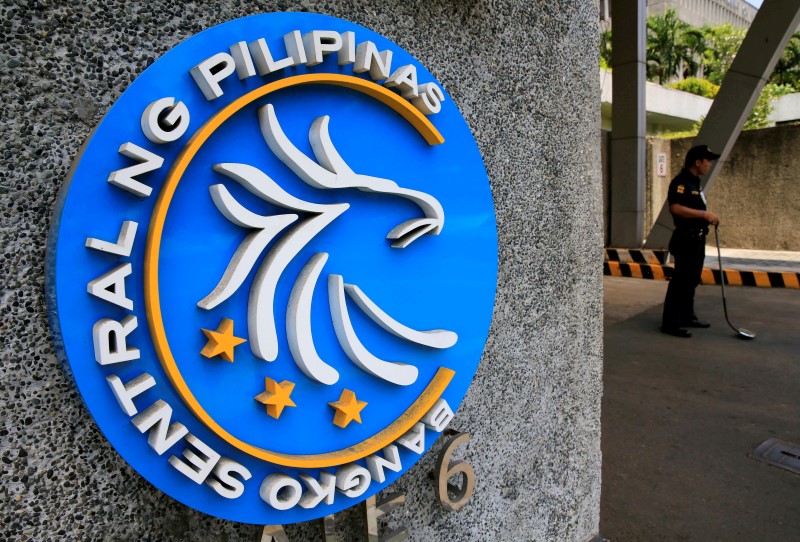* BSP keeps RRP rate at record-low 2.0%
* Central bank says inflation to remain within target
* Rates cut by total of 200 bps this year
(Adds quotes, inflation forecasts, background)
By Neil Jerome Morales and Enrico Dela Cruz
MANILA, Dec 17 (Reuters) - The Philippine central bank left
key interest rates steady at its last policy meeting in 2020
after a series of rate cuts earlier in the year aimed at
reviving a pandemic-hit economy, but signalled readiness to take
further action if needed.
The Bangko Sentral ng Pilipinas (BSP) kept the rate on the
overnight reverse repurchase facility PHCBIR=ECI at a record
low of 2.0% on Thursday, in line with market expectations.
The rates on the overnight deposit and lending facilities
were likewise kept at 1.5% and 2.5%, respectively.
"The Monetary Board is of the view that monetary policy
settings remain appropriate," BSP Governor Benjamin Diokno said.
"An accommodative monetary policy stance, together with
sustained fiscal initiatives to ensure public welfare, should
quicken the economy's transition toward a sustainable recovery,"
he said.
The BSP slashed rates by a cumulative 200 basis points this
year, including a surprise 25 bps reduction last month, making
it one of the most aggressive central banks worldwide in policy
easing.
It has also provided additional liquidity support to the
economy by purchasing government securities and extending loans
to the government.
Still, Diokno said the central bank "remains committed to
deploying its full range of instruments as needed" to support an
economy that shrank more than expected in the third quarter on
an annual basis, hit by tepid demand and government spending.
The sluggish domestic demand has kept inflation largely
manageable.
The BSP raised its inflation forecasts to 2.6% this year
from 2.4% previously, and to 3.2% for next year from 2.7%, still
well within the target range of 2%-4% for both years.
"We believe the BSP is slowly running down its available
space to cut rates although we do not count out future rate cuts
especially if economic activity remains subdued early on in
2021," said Nicholas Mapa, a senior economist at ING.
- English (USA)
- English (UK)
- English (India)
- English (Canada)
- English (Australia)
- English (South Africa)
- English (Nigeria)
- Deutsch
- Español (España)
- Español (México)
- Français
- Italiano
- Nederlands
- Português (Portugal)
- Polski
- Português (Brasil)
- Русский
- Türkçe
- العربية
- Ελληνικά
- Svenska
- Suomi
- עברית
- 日本語
- 한국어
- 简体中文
- 繁體中文
- Bahasa Indonesia
- Bahasa Melayu
- ไทย
- Tiếng Việt
- हिंदी
UPDATE 1-Philippine c.bank holds rates steady but maintains dovish tone
Published 12/17/2020, 04:57 PM
Updated 12/17/2020, 05:00 PM
UPDATE 1-Philippine c.bank holds rates steady but maintains dovish tone

Latest comments
Install Our App
Risk Disclosure: Trading in financial instruments and/or cryptocurrencies involves high risks including the risk of losing some, or all, of your investment amount, and may not be suitable for all investors. Prices of cryptocurrencies are extremely volatile and may be affected by external factors such as financial, regulatory or political events. Trading on margin increases the financial risks.
Before deciding to trade in financial instrument or cryptocurrencies you should be fully informed of the risks and costs associated with trading the financial markets, carefully consider your investment objectives, level of experience, and risk appetite, and seek professional advice where needed.
Fusion Media would like to remind you that the data contained in this website is not necessarily real-time nor accurate. The data and prices on the website are not necessarily provided by any market or exchange, but may be provided by market makers, and so prices may not be accurate and may differ from the actual price at any given market, meaning prices are indicative and not appropriate for trading purposes. Fusion Media and any provider of the data contained in this website will not accept liability for any loss or damage as a result of your trading, or your reliance on the information contained within this website.
It is prohibited to use, store, reproduce, display, modify, transmit or distribute the data contained in this website without the explicit prior written permission of Fusion Media and/or the data provider. All intellectual property rights are reserved by the providers and/or the exchange providing the data contained in this website.
Fusion Media may be compensated by the advertisers that appear on the website, based on your interaction with the advertisements or advertisers.
Before deciding to trade in financial instrument or cryptocurrencies you should be fully informed of the risks and costs associated with trading the financial markets, carefully consider your investment objectives, level of experience, and risk appetite, and seek professional advice where needed.
Fusion Media would like to remind you that the data contained in this website is not necessarily real-time nor accurate. The data and prices on the website are not necessarily provided by any market or exchange, but may be provided by market makers, and so prices may not be accurate and may differ from the actual price at any given market, meaning prices are indicative and not appropriate for trading purposes. Fusion Media and any provider of the data contained in this website will not accept liability for any loss or damage as a result of your trading, or your reliance on the information contained within this website.
It is prohibited to use, store, reproduce, display, modify, transmit or distribute the data contained in this website without the explicit prior written permission of Fusion Media and/or the data provider. All intellectual property rights are reserved by the providers and/or the exchange providing the data contained in this website.
Fusion Media may be compensated by the advertisers that appear on the website, based on your interaction with the advertisements or advertisers.
© 2007-2024 - Fusion Media Limited. All Rights Reserved.